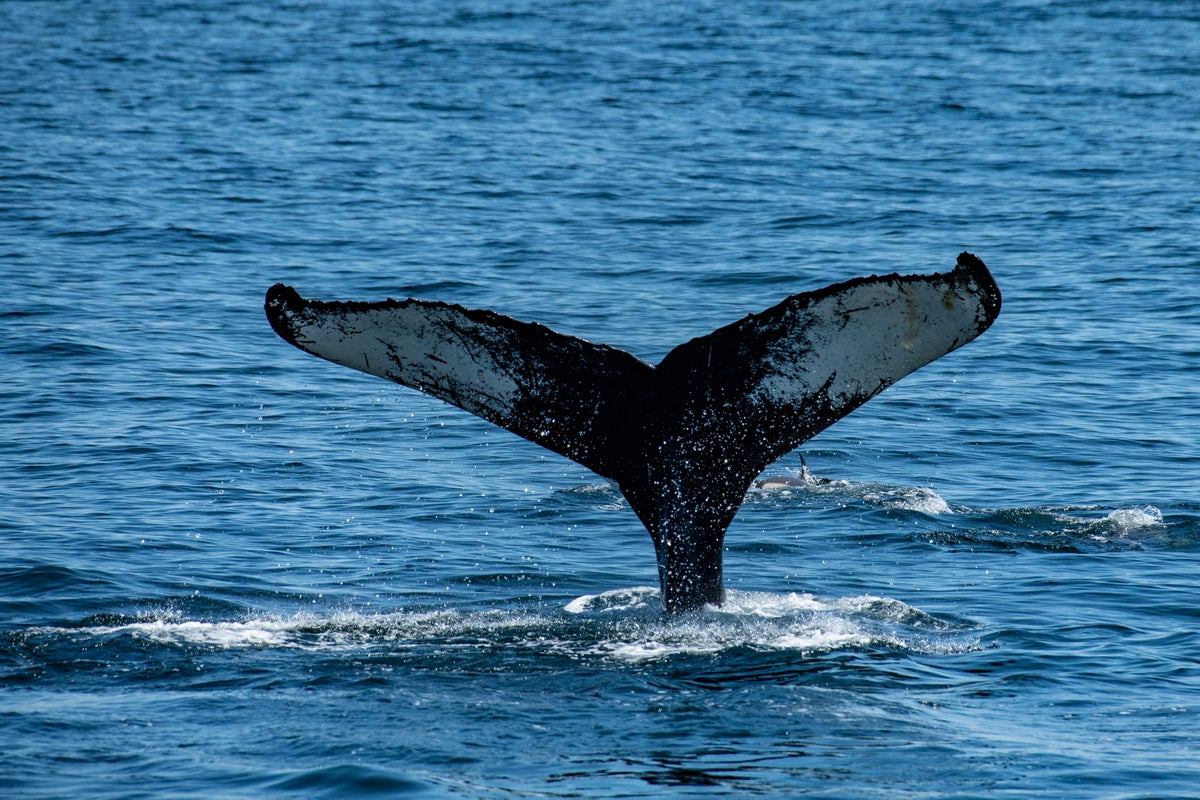
President Donald Trump is once again peddling a largely unfounded claim that wind energy is driving whales crazy.
“You know, in one area, they lost two whales, like, in 20 years washed ashore,” he told reporters at the White House on Wednesday, “and this year they had 17 wash ashore.”
“So, there’s something [that] happened out there,” Trump alleged. “There’s something driving the whales a little bit loco.”
It’s a claim he’s repeated for months. He told the same story about whale strandings in Massachusetts with different numbers in February. “The wind mills are driving the whales crazy, obviously,” he posited. He said the same thing in January, ahead of his inauguration, and brought the issue up during the last days of his campaign. Then, he discussed similar impacts in New Jersey. “
Now, they’re coming up every week. They’re being destroyed because of the sound and the vibration,” he alleged. “It’s so bad.”
But, scientists at the National Oceanic and Atmospheric Administration say there is no scientific evidence that noise resulting from offshore wind site surveys could potentially cause whale deaths and that there are no known links between large whale deaths and ongoing offshore wind activities.
Some advocate groups agree with Trump’s stance, saying that associations between strandings and wind development should not be ruled out. Experts are still working to understand why strandings — which happen around the world, and in remote areas — have become more frequent, suggesting that many follow distress calls and that underwater noise pollution can be an issue, as it is for many sea creatures.
But not the ones who work for the federal government.
“We will continue to gather data to help us determine the cause of these whale deaths. We will also continue to explore how sound, vessel, and other human activities in the marine environment impact whales and other marine mammals,” NOAA said.
While offshore wind surveys conducted before development produce noises that may disturb marine mammals, the sounds are very different from the blasting seismic airguns used in oil and gas surveys, with lower noise and a higher frequency. Any exposure to the sounds would be at “significantly lower levels and shorter duration, which is associated with less severe impacts to marine mammals,” NOAA said.
Even though other scientists do not dismiss effects wind development could have, they stress there has not been a link to strandings around Massachusetts or elsewhere.
Massachusetts charity Whale and Dolphin Conservation spokesperson Caroline Mowdy told the Cape Cod Times that no seismic surveys or wind construction have occurred within the group’s 200-mile stranding response area, “yet we are seeing a dramatic increase in large whale strandings.”
“Periodically we read in the news that a whale or some other large animal ends up on the shore, and a lot of times the blame immediately goes to wind turbines. People feel the problem must come from turbine construction noise. Yet when the whales drift ashore, no construction is taking place,” James Miller, University of Rhode Island professor of ocean engineering and department chair, said in 2023.
The National Marine Fisheries Service said in September that the Vineyard Wind wind farm off the coast of Nantucket is “not likely to jeopardize the continued existence” of endangered whales, including the North Atlantic right whale. Although, other activity still poses an adverse effect, according to the Boston Herald.
“My understanding is that whales can be negatively affected (but not killed) by the noise of the pile driving used to install some kinds of wind farm, but operational wind farms have little or no effect,” Hal Whitehead, a professor of biology at Dalhousie University, told Phys.org.
“There is no evidence linking whale deaths to offshore wind farms or ‘windmills,'” Lindy Weilgart, an ocean noise expert and policy consultant at the nonprofit OceanCare, told the site. “Europe has way more offshore wind farms and has encountered nothing of the sort.”
The largest human threats to whales are boat strikes and entanglement in fishing gear. However, man-made climate change is a concern that threatens the gentle giants and their food chain, with warming waters shifting prey distribution and bringing the whales closer to shore.
“As someone who studied large whales for my multi-decade career and who also, as a person, just really cares deeply about them … the focus for protecting whales really has to be on reducing entanglements and vessel strikes,” Jessica Redfern, the associate vice president of ocean conservation science at the New England Aquarium, told Boston.com.
“We need to minimize the effects of climate change as fast as we can. And offshore wind is one of our tools as long as it is responsibly developed,” she said.
Source: independent.co.uk


